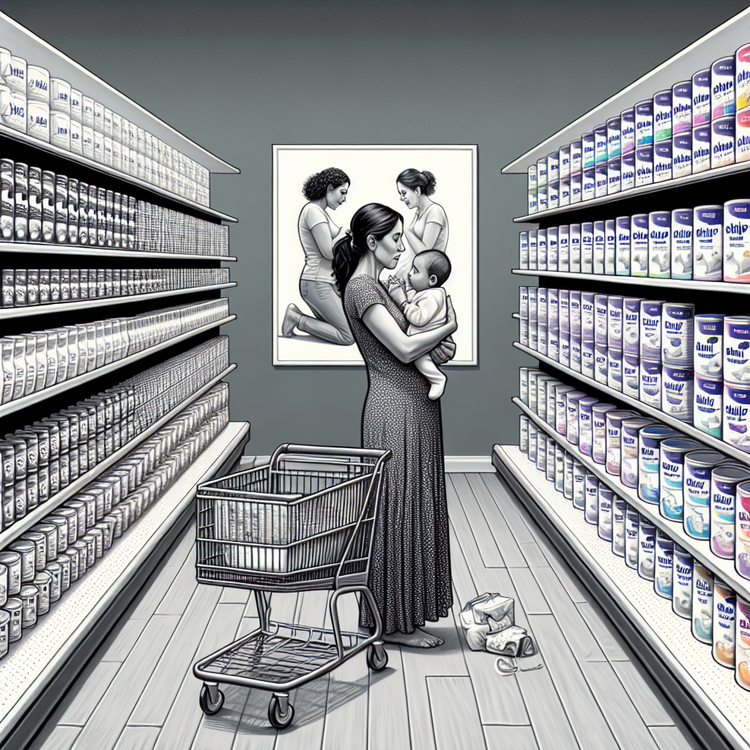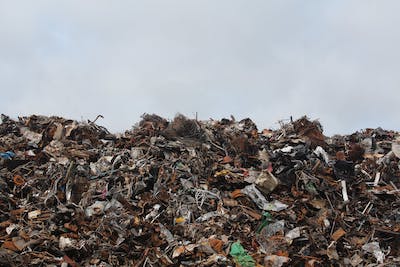The cost of baby formula has been increasing, causing financial difficulties for many parents. Single mother Emma Davies, for example, struggles to afford formula for her 13-week-old daughter. Despite the high cost, she refuses to buy cheaper alternatives because she wants the best for her child. Other parents share this sentiment and are willing to make sacrifices to ensure their children are well-fed. According to the Competition and Markets Authority (CMA), formula prices have risen by 25% in the past two years, resulting in significant profits for formula manufacturers.
The market for baby formula is dominated by two major players: Danone, which owns the Aptamil and Cow & Gate brands, and Nestle, which owns SMA and Little Steps. These companies hold an 85% market share, limiting the availability of alternative brands. The CMA suggests that parents could save £500 in the first year of their baby’s life by exploring other options. However, some parents worry that cheaper brands may be less nutritious. Professor Amy Brown, an expert in maternal and infant health, reassures parents that all infant formulas are tightly regulated to ensure they contain the necessary nutrients.
One reason parents may be hesitant to switch to cheaper brands is the belief that higher prices indicate better quality. However, price does not necessarily reflect the quality of the product. The UK law prohibits the advertising of infant formula for babies up to six months old, as it may discourage breastfeeding. Retailers are also restricted from promoting special offers for infant formula, although they can do so for follow-on formula for babies older than six months. Some supermarkets, such as Iceland, are calling for a change in these regulations to provide more options for parents and alleviate financial pressures.
The limited availability of own-brand formula products contributes to the problem. Currently, Aldi is the only supermarket that offers its own brand of formula called Mamia. Campaigners are urging more retailers to follow suit to provide affordable alternatives. The rising cost of formula, along with other expenses such as bills and rent, has put many families under significant financial strain. Sophie Livingstone, CEO of charity Little Village HQ, reports that families are making difficult choices, such as diluting formula or rationing diapers, due to financial constraints.
The CMA has announced an investigation into the baby formula market, with an update expected in mid-2024. The increasing demand for assistance from charities like Little Village HQ indicates the growing pressure on families. The cost of living has risen, making it even more challenging for parents to provide for their children.
Original news source: Baby formula soaring costs: ‘I struggle, but I won’t buy a cheaper brand’ (BBC)
Listen:
Slow
Normal
Fast
Vocabulary:
| 1 | formula | A substance used as a substitute for breast milk, typically for infants |
| 2 | increasing | Becoming greater or larger in amount, number, or degree |
| 3 | financial | Relating to money or the management of money |
| 4 | struggles | Experiencing difficulty or hardship |
| 5 | sacrifices | Giving up something valuable or important for the sake of something else |
| 6 | significant | Important or noticeable |
| 7 | dominated | Controlled or governed by a particular group or individual |
| 8 | availability | The state of being able to be obtained or used |
| 9 | hesitant | Reluctant or unwilling to do something |
| 10 | indicate | Serve as a sign or indication of something |
| 11 | restricted | Subject to certain limitations or restrictions |
| 12 | alleviate | Make (suffering, deficiency, or a problem) less severe |
| 13 | contributes | Play a part in bringing about a result or situation |
| 14 | investigation | A formal or systematic examination or research |
| 15 | pressure | The use of persuasion, influence, or intimidation to make someone do something |
Group or Classroom Activities
Warm-up Activities:
– News Summary
Instructions: In pairs or small groups, students will read the article and then collaboratively write a summary of the main points. They should focus on capturing the key information and presenting it in a concise and clear manner. Afterward, each group can share their summaries with the class.
– Opinion Poll
Instructions: Students will work individually or in pairs to create a short opinion poll related to the topic of baby formula prices. They should come up with at least five questions that explore different perspectives and attitudes. Once the polls are created, students can exchange them with their classmates and collect responses. They can then analyze and discuss the results as a class.
– Headline Creation
Instructions: In pairs or small groups, students will create catchy and informative headlines based on the article. They should aim to capture the essence of the topic and attract readers’ attention. Afterward, each group can share their headlines and discuss why they chose them.
– Pros and Cons
Instructions: Students will create a pros and cons list related to the topic of baby formula prices. They should consider both sides of the argument and include at least three points in each list. Once the lists are complete, students can pair up and engage in a debate, presenting their points and discussing the advantages and disadvantages of different perspectives.
– Future Predictions
Instructions: In pairs or small groups, students will discuss and make predictions about the future of baby formula prices. They should consider factors such as market trends, consumer demands, and potential regulatory changes. Each group can then present their predictions to the class and engage in a discussion about the likelihood and potential impact of their scenarios.
Comprehension Questions:
1. Why is the cost of baby formula causing financial difficulties for many parents?
2. Why does Emma Davies refuse to buy cheaper alternatives for her daughter?
3. According to the Competition and Markets Authority (CMA), how much have formula prices risen in the past two years?
4. Which two companies dominate the market for baby formula?
5. Why do some parents worry that cheaper brands may be less nutritious?
6. Why are some parents hesitant to switch to cheaper brands, even though they may be just as nutritious?
7. What restrictions are in place regarding the advertising and promotion of infant formula?
8. What is one solution that some supermarkets, like Iceland, are calling for to provide more options for parents?
Go to answers ⇩
Listen and Fill in the Gaps:
The cost of baby formula has been increasing, causing financial difficulties for many parents. (1)______ mother Emma Davies, for example, struggles to afford formula for her 13-week-old daughter. Despite the high cost, she refuses to buy (2)______ alternatives because she wants the best for her child. Other parents share this sentiment and are (3)______ to make sacrifices to ensure their children are well-fed. According to the Competition and (4)______ Authority (CMA), formula prices have risen by 25% in the past two years, resulting in significant profits for formula manufacturers.
The market for baby formula is dominated by two major players: Danone, which owns the Aptamil and Cow & Gate brands, and Nestle, which owns SMA and Little Steps. These companies hold an 85% market share, limiting the availability of alternative brands. The CMA suggests that parents could save £500 in the first year of their baby’s life by exploring other options. However, some parents worry that cheaper brands may be less (5)______. Professor Amy Brown, an expert in maternal and infant health, (6)______ parents that all infant formulas are tightly regulated to ensure they contain the necessary nutrients.
One reason parents may be hesitant to switch to cheaper brands is the belief that higher (7)______ indicate (8)______ quality. However, price does not necessarily reflect the quality of the product. The UK law (9)______ the advertising of infant formula for babies up to six months old, as it may discourage breastfeeding. Retailers are also restricted from promoting special (10)______ for infant formula, although they can do so for follow-on formula for babies older than six months. Some supermarkets, such as (11)______, are calling for a (12)______ in these regulations to provide more options for parents and alleviate financial pressures.
The limited availability of own-brand formula products contributes to the problem. Currently, Aldi is the only supermarket that offers its own brand of formula called Mamia. Campaigners are urging more retailers to follow suit to provide affordable alternatives. The rising cost of formula, along with other expenses such as bills and rent, has put many (13)______ under significant financial strain. Sophie Livingstone, CEO of charity Little Village HQ, reports that families are making difficult choices, such as diluting formula or rationing diapers, due to financial constraints.
The CMA has (14)______ an (15)______ into the baby formula market, with an update expected in mid-2024. The increasing demand for (16)______ from charities like Little Village HQ indicates the growing pressure on families. The cost of living has risen, making it even more challenging for parents to provide for their children.
Go to answers ⇩
Discussion Questions:
Students can ask a partner these questions, or discuss them as a group.
1. What is your opinion on the rising cost of baby formula?
2. How would you feel if you were a parent struggling to afford formula for your child?
3. Do you think it’s worth it for parents to buy more expensive formula for their children? Why or why not?
4. What are some sacrifices you think parents might have to make in order to afford formula for their children?
5. How do you think the limited availability of alternative brands affects parents’ choices?
6. Do you believe that higher prices always indicate better quality? Why or why not?
7. What do you think about the UK law that prohibits the advertising of infant formula for babies up to six months old?
8. Should retailers be allowed to promote special offers for infant formula? Why or why not?
9. How do you think the limited availability of own-brand formula products contributes to the problem?
10. Have you ever had to make difficult choices due to financial constraints? Can you share your experience?
11. What do you think about the CMA’s investigation into the baby formula market? Do you think it will lead to any changes?
12. Have you noticed an increase in the cost of living in your country? How has it affected families?
13. Do you think the government should provide more financial assistance to families struggling to afford baby formula? Why or why not?
14. What are some other ways parents can save money on baby formula without compromising their child’s nutrition?
15. How do you think the rising cost of formula affects parents’ overall well-being and stress levels?
Individual Activities
Vocabulary Meanings:
Match each word to its meaning.
Words:
1. formula
2. increasing
3. financial
4. struggles
5. sacrifices
6. significant
7. dominated
8. availability
9. hesitant
10. indicate
11. restricted
12. alleviate
13. contributes
14. investigation
15. pressure
Meanings:
(A) Giving up something valuable or important for the sake of something else
(B) Important or noticeable
(C) Serve as a sign or indication of something
(D) Controlled or governed by a particular group or individual
(E) The use of persuasion, influence, or intimidation to make someone do something
(F) The state of being able to be obtained or used
(G) A formal or systematic examination or research
(H) Make (suffering, deficiency, or a problem
(I) Subject to certain limitations or restrictions
(J) Relating to money or the management of money
(K) Becoming greater or larger in amount, number, or degree
(L) Play a part in bringing about a result or situation
(M) Reluctant or unwilling to do something
(N) Experiencing difficulty or hardship
(O) A substance used as a substitute for breast milk, typically for infants
Go to answers ⇩
Multiple Choice Questions:
1. Why is the cost of baby formula causing financial difficulties for parents?
(a) It is too expensive
(b) It has been increasing
(c) Parents refuse to buy cheaper alternatives
(d) Formula manufacturers are making significant profits
2. Which two companies dominate the market for baby formula?
(a) Danone and Nestle
(b) Aptamil and Cow & Gate
(c) SMA and Little Steps
(d) Aldi and Mamia
3. According to the CMA, how much money could parents save in the first year of their baby’s life by exploring other formula options?
(a) £1000
(b) £250
(c) £500
(d) £100
4. What does Professor Amy Brown reassure parents about regarding cheaper brands of formula?
(a) They are tightly regulated
(b) They contain the necessary nutrients
(c) They are less nutritious
(d) They are more affordable
5. Why are some parents hesitant to switch to cheaper brands of formula?
(a) Cheaper brands are less nutritious
(b) Cheaper brands are not regulated
(c) They are not widely available
(d) They believe higher prices indicate better quality
6. What does UK law prohibit regarding the advertising of infant formula?
(a) Advertising for babies older than six months
(b) Advertising for all infant formula
(c) Advertising for babies up to six months old
(d) Advertising for follow-on formula
7. Which supermarket currently offers its own brand of formula called Mamia?
(a) Aldi
(b) Iceland
(c) Little Village HQ
(d) Danone
8. Why are families making difficult choices such as diluting formula or rationing diapers?
(a) The limited availability of own-brand formula products
(b) The rising cost of bills and rent
(c) The increasing demand for assistance from charities
(d) Due to financial constraints
Go to answers ⇩
True or False Questions:
1. The cost of baby formula has been decreasing, causing financial difficulties for many parents.
2. The UK law prohibits the advertising of infant formula for babies up to six months old.
3. The abundant availability of own-brand formula products contributes to the problem.
4. The market for baby formula is evenly distributed among multiple players: Danone and Nestle.
5. Formula prices have risen by 25% in the past two years, resulting in significant profits for formula manufacturers.
6. These companies hold an 85% market share, limiting the availability of alternative brands.
7. Some parents don’t worry that cheaper brands may be less nutritious, but all infant formulas are loosely regulated to ensure they contain the necessary nutrients.
8. Single mother Emma Davies struggles to afford formula for her 13-week-old daughter.
Go to answers ⇩
Write a Summary:
Write a summary of this news article in two sentences.
Check your writing now with the best free AI for English writing!
Writing Questions:
Answer the following questions. Write as much as you can for each answer.
Check your answers with our free English writing assistant!
1. How has the cost of baby formula been affecting parents financially?
2. Why are some parents hesitant to buy cheaper alternatives to baby formula?
3. What are the two major players in the baby formula market?
4. What regulations are in place regarding the advertising and promotion of infant formula?
5. What are some of the difficult choices that families are making due to financial constraints?
Answers
Comprehension Question Answers:
1. The cost of baby formula is causing financial difficulties for many parents because it has been increasing, making it more expensive to purchase.
2. Emma Davies refuses to buy cheaper alternatives for her daughter because she wants the best for her child and believes that the more expensive formula is of higher quality.
3. According to the Competition and Markets Authority (CMA), formula prices have risen by 25% in the past two years.
4. The two companies that dominate the market for baby formula are Danone, which owns the Aptamil and Cow & Gate brands, and Nestle, which owns SMA and Little Steps.
5. Some parents worry that cheaper brands may be less nutritious because they believe that higher prices indicate better quality.
6. Some parents are hesitant to switch to cheaper brands, even if they are just as nutritious, because they believe that higher prices reflect better quality.
7. The UK law prohibits the advertising of infant formula for babies up to six months old, as it may discourage breastfeeding. Retailers are also restricted from promoting special offers for infant formula, although they can do so for follow-on formula for babies older than six months.
8. One solution that some supermarkets, like Iceland, are calling for to provide more options for parents is a change in regulations to allow for the promotion and availability of own-brand formula products.
Go back to questions ⇧
Listen and Fill in the Gaps Answers:
(1) Single
(2) cheaper
(3) willing
(4) Markets
(5) nutritious
(6) reassures
(7) prices
(8) better
(9) prohibits
(10) offers
(11) Iceland
(12) change
(13) families
(14) announced
(15) investigation
(16) assistance
Go back to questions ⇧
Vocabulary Meanings Answers:
1. formula
Answer: (O) A substance used as a substitute for breast milk, typically for infants
2. increasing
Answer: (K) Becoming greater or larger in amount, number, or degree
3. financial
Answer: (J) Relating to money or the management of money
4. struggles
Answer: (N) Experiencing difficulty or hardship
5. sacrifices
Answer: (A) Giving up something valuable or important for the sake of something else
6. significant
Answer: (B) Important or noticeable
7. dominated
Answer: (D) Controlled or governed by a particular group or individual
8. availability
Answer: (F) The state of being able to be obtained or used
9. hesitant
Answer: (M) Reluctant or unwilling to do something
10. indicate
Answer: (C) Serve as a sign or indication of something
11. restricted
Answer: (I) Subject to certain limitations or restrictions
12. alleviate
Answer: (H) Make (suffering, deficiency, or a problem
13. contributes
Answer: (L) Play a part in bringing about a result or situation
14. investigation
Answer: (G) A formal or systematic examination or research
15. pressure
Answer: (E) The use of persuasion, influence, or intimidation to make someone do something
Go back to questions ⇧
Multiple Choice Answers:
1. Why is the cost of baby formula causing financial difficulties for parents?
Answer: (b) It has been increasing
2. Which two companies dominate the market for baby formula?
Answer: (a) Danone and Nestle
3. According to the CMA, how much money could parents save in the first year of their baby’s life by exploring other formula options?
Answer: (c) £500
4. What does Professor Amy Brown reassure parents about regarding cheaper brands of formula?
Answer: (b) They contain the necessary nutrients
5. Why are some parents hesitant to switch to cheaper brands of formula?
Answer: (d) They believe higher prices indicate better quality
6. What does UK law prohibit regarding the advertising of infant formula?
Answer: (c) Advertising for babies up to six months old
7. Which supermarket currently offers its own brand of formula called Mamia?
Answer: (a) Aldi
8. Why are families making difficult choices such as diluting formula or rationing diapers?
Answer: (d) Due to financial constraints
Go back to questions ⇧
True or False Answers:
1. The cost of baby formula has been decreasing, causing financial difficulties for many parents. (Answer: False)
2. The UK law prohibits the advertising of infant formula for babies up to six months old. (Answer: True)
3. The abundant availability of own-brand formula products contributes to the problem. (Answer: False)
4. The market for baby formula is evenly distributed among multiple players: Danone and Nestle. (Answer: False)
5. Formula prices have risen by 25% in the past two years, resulting in significant profits for formula manufacturers. (Answer: True)
6. These companies hold an 85% market share, limiting the availability of alternative brands. (Answer: True)
7. Some parents don’t worry that cheaper brands may be less nutritious, but all infant formulas are loosely regulated to ensure they contain the necessary nutrients. (Answer: False)
8. Single mother Emma Davies struggles to afford formula for her 13-week-old daughter. (Answer: True)
Go back to questions ⇧















